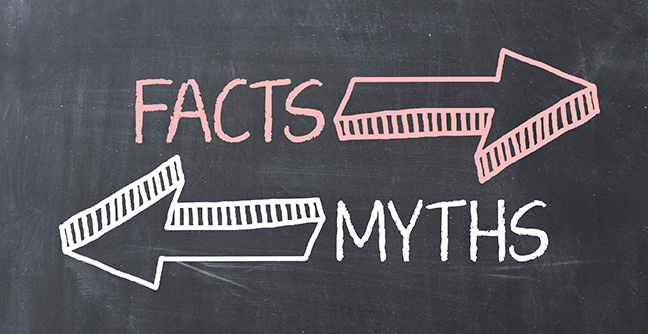
Myth: The COVID-19 vaccines aren’t safe because they were developed so quickly.
Truth: The vaccines were indeed developed much faster than typical vaccines are normally developed. This is largely due to funding, getting the genetic code early, using technology that has been in development and testing for many years and the rapid recruitment rate of volunteers for clinical trials.
Due to the fact that COVID-19 was a global pandemic, the world worked together to create a safe and effective vaccine as quickly as possible. This meant that researchers and scientists were sharing their coronavirus data, including the genetic code of SARS-CoV-2 (the coronavirus behind COVID-19). Funding wasn’t an issue like it has been for other projects in the past. There were tens of thousands of volunteers that wanted to be involved in the clinical trials to help bring the pandemic to an end. All of these factors led to the rapid development of the vaccine, but no steps were skipped or corners cut during the development and testing process.
Myth: I can get coronavirus from the COVID-19 vaccine.
Truth: It is not possible to get coronavirus from the current vaccines. The current vaccines, from Pfizer and Moderna, do not contain live viruses. Instead, the vaccine makes our bodies produce proteins that help prevent infection.
It is possible to become infected with the virus just before or just after you have been vaccinated. This is because the vaccine would not have had enough time to provide full protection. There is some protection in the weeks after the first shot, but data shows that it takes 7-10 days after the second shot to get the best impact of immunization.
Myth: Cancer patients shouldn’t receive the vaccine.
Truth: The early data shows the vaccine to be safe for cancer patients. Cancer patients are encouraged to receive the vaccine once it becomes available to them. Cancer patients, particularly those getting treatments affecting their immune system, can have a higher risk of becoming sick from Covid-19. The risks of having Covid-19 far outweigh the risks from the vaccine.
A few of my patients that are currently receiving radiation have reported that they have already gotten the first dose of the vaccine. Check frequently with your local health department on when the vaccine will be available to you.
Myth: I have already had coronavirus, so I don’t need to get vaccinated.
Truth: You can become infected with COVID-19 more than once. Therefore you should still get vaccinated even if you have tested positive previously. Experts do not know how long the natural immunity lasts if you have previously been infected with COVID-19.
The CDC recommends that individuals that have been infected with COVID-19 wait 90 days after diagnosis to get the vaccine. If you have had COVID-19, talk to your provider about timing your vaccine.
Myth: The vaccine can alter my DNA.
Truth: The mRNA COVID-19 vaccines do not interact or change your DNA in any way. The mRNA from the vaccine never enters the nucleus of the cell, which is where our DNA is kept. Instead, it teaches our cells how to make a protein that helps prevent infection.
Myth: The vaccine will affect my cancer treatment.
Truth: At this time, there is no data to suggest that the vaccine will affect cancer treatments. It is recommended that you talk to your cancer care provider if you have questions or concerns.
Myth: After I get the vaccine, I can stop wearing my mask and stop social distancing.
Truth: We must maintain current procedures with Personal Protective Equipment (PPE), social distancing, and frequent hand washing even after we receive the vaccine. The rate of asymptomatic infection and ability to spread the virus after vaccination is still unclear. So, even after you have been fully vaccinated, you need to maintain precautions to ensure the safety of others who have not been or cannot be vaccinated. We do expect to see more information on this topic in the coming weeks to months.
Myth: I may have serious side effects from the vaccine.
Truth: Serious side effects from the vaccine are rare, and getting the vaccine is much less risky than getting COVID-19. Some minor side effects are common, such as pain at the injection site, headache, fever, feeling tired or being achy for a day or 2. This is actually a good thing, it’s a sign that the vaccine is working.
Myth: This is the last vaccine blog in this series.
Truth: This is not the last blog in this series and there are several more to follow. In our next vaccine blogs, we will discuss the questions and conversations that cancer patients should have with their cancer care providers about the vaccine. We will discuss the importance of having a plan in place for when the vaccine is available for you. We will also discuss what happens after you receive the vaccine.
Courtney is a Radiation Therapist at Penn Medicine in the Department of Radiation Oncology. She completed her Bachelor’s Degree in Radiation Therapy from Indiana University, and received her Master’s Degree in Public Health with concentrations in Health Management and Policy and Health Education and Promotion from Benedictine University. She has fourteen years of experience in radiation therapy, which includes an expertise in proton therapy and pediatrics. Courtney has worked with OncoLink since 2014, but joined part-time in 2020 as a Global Education Coordinator and is currently developing virtual reality training modules that have been used to train radiation therapists both domestically and internationally.